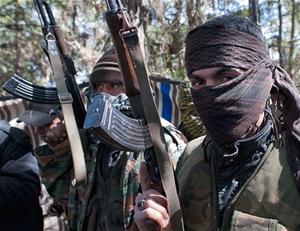SyriaPowerful groups abandon rebel coalition, join Jihadist al Nusra Front
The Syrian rebel coalition fighting the regime of President Bashar al-Assad – its official name is the National Coalition of Syrian Revolutionary and Opposition Forces, and it is led by Ahmad al-Jarba — has suffered a major blow Tuesday when eleven rebel groups, among them some of the most powerful ones in the rebel coalition, announced they were abandoning the coalition and joining forces with al Nusra Front, an al Qaeda-affiliated group. Among the eleven groups are secular groups aligned with the Western-backed opposition’s Supreme Military Council. It thus appears that the move by the eleven groups was motivated less by ideological or religious considerations, and more by an assessment that strengthening the al Nusra-led side among the rebels would be a more effective way to bring down the Assad regime.

Eleven moderate Syrian groups join forces with al-Qaeda // Source: kienthuc.net.vn
The Syrian rebel coalition fighting the regime of President Bashar al-Assad – its official name is the National Coalition of Syrian Revolutionary and Opposition Forces, and it is led by Ahmad al-Jarba — has suffered a major blow Tuesday when eleven rebel groups, among them some of the most powerful ones in the rebel coalition, announced they were abandoning the coalition and joining forces with an al Qaeda-affiliated group. They explained their decision by declaring that the opposition could be represented only by people who have “lived their troubles and shared in what they have sacrificed.”
The anti-Assad coalition has been deeply fractured from the start, both within Syria and among the many representatives of the various groups who claim to speak for the opposition outside the country. Recently, the fissures have only deepened, for three reasons:
- The rebels have suffered major setbacks on the battlefield. While Assad has enjoyed the unwavering material and political support of Iran and Russia, and, since late spring, of thousands of Hezbollah fighters, the aid to the pro-West rebels has not been militarily significant, leading to losses in key strategic theaters.
- The al Qaeda-affiliated rebels have continued to receive generous financial support from Qatar, allowing them to buy large quantities of weapons through a network of shady arms dealers, and perform much better on the battlefield relative to the larger, but more poorly armed, groups of moderate anti-Assad rebels.
- The recent U.S.-Russian agreement on Syria’s chemical weapons has weakened support in Western capitals for the moderate rebels: the Obama administration and the Europeans have shifted the focus of their Syria policy from removing Assad from power to gaining control over and dismantling his chemical weapons. The cooperation of Russia, and possibly Iran, is essential for this effort, and their cooperation could not be gained without a relaxation of the demand that Assad must go.
The leaders of the eleven groups which bolted out of the rebel coalition made a point of distancing themselves from calls made by the rebel coalition’s exile representative, who said that the goal of the anti-Assad coalition was to create a democratic, civil government. Instead, the leaders who pulled their groups into an association with al Qaeda said their goal was to unify all military and civilian groups opposing Assad “in a clear Islamic frame.”
